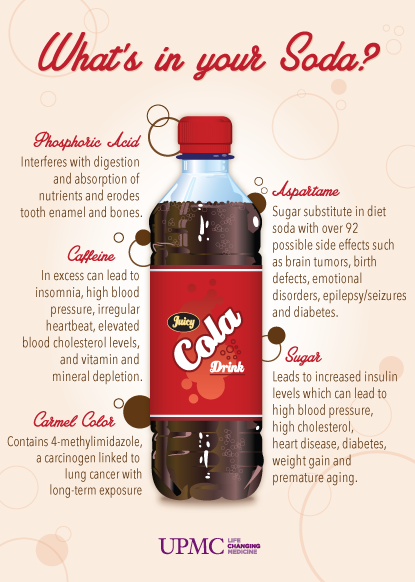It’s delicious, refreshing, and bubbly, and that is probably why soda is consumed by many on a daily basis. Whether as a treat or a caffeine boost, it is widely consumed. However much you may enjoy it, it is important to recognize that it may not be the best thing for your health. Check out our infographic to find out everything that can be found in your soda.

Aspartame in Soda
Aspartame is a sugar substitute that can be found in diet soda, as well as dairy products, desserts, and tabletop sweeteners. While this is an FDA-approved sweetener, there are beliefs that aspartame can be linked to:
- Brain tumors
- Birth defects
- Emotional disorders
- Epilepsy/seizures
- Diabetes
Never Miss a Beat!
Subscribe to Our HealthBeat Newsletter!
Thank you for subscribing!
You can now select the specific newsletters you'd like to receive.
You are already subscribed.
Subscribe to more newsletters in our email preference center.
Sorry, an error occurred. Please try again later.
Get Healthy Tips Sent to Your Phone!
Sugar in Soda
A high intake of sugar can leads to increased insulin levels which can lead to:
- High blood pressure
- High cholesterol
- Heart disease
- Diabetes
- Weight gain
- Premature aging
The new World Health Organization (WHO) guideline recommends adults to consume about 25 grams of sugar per day. A single can of soda can have as much as 33 grams of sugar, easily putting you over the recommended daily limit.
Caffeine in Soda
Caffeine can be naturally found in soda, tea, coffee, and chocolate. While you may feel like that caffeine boost is necessary to get the day started, too much can have some unpleasant side effects. When consumed in excess it can lead to:
- Insomnia
- High blood pressure
- Irregular heartbeat
- Elevated blood cholesterol levels
- Vitamin and mineral depletion
Caffeine can speed up your heart rate, creating an uneven heartbeat, and raising blood pressure and blood cholesterol. Therefore it is recommended that people with heart problems eliminate or restrict caffeine intake.
Caramel Color in Soda
In order for the darker sodas to get that dark caramel color, many will contain 4-methylimidazole, a carcinogen that has been linked to lung cancer with long-term exposure.
Phosphoric Acid in Soda
Phosphoric acid interferes with digestion and absorption of nutrients. On top of that it also erodes tooth enamel and bones.
About Digestive Disorders
UPMC Digestive Health Care cares for a wide range of gastrointestinal (GI) conditions and diseases, from diagnosis to treatment. Whether your digestive condition is common or complicated, our experts can help. Upon referral from your physician, we coordinate your testing and treatment. If you have a complicated condition, we can refer you to one of UPMC’s digestive health centers of excellence. Find a GI doctor near you.
